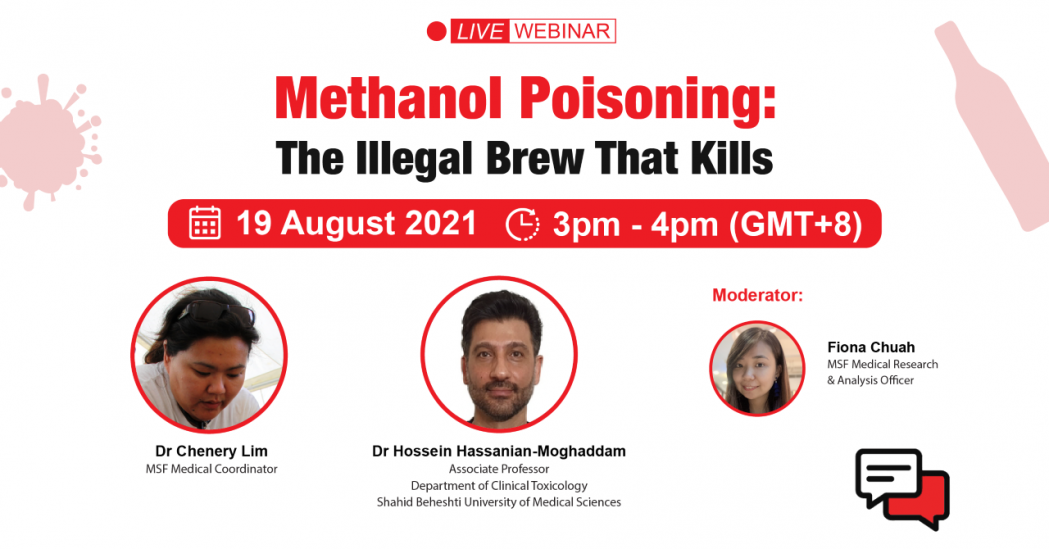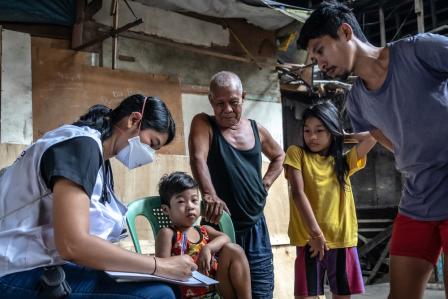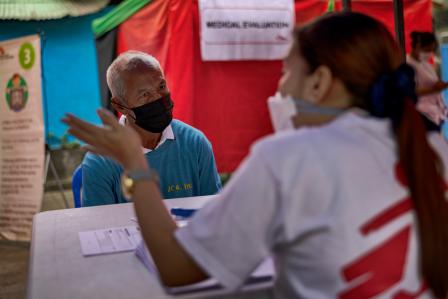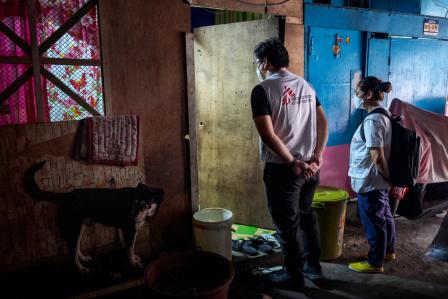PRESS RELEASE: Beware of ‘bootleg’ alcohol – it can cause blindness and death

In the “Methanol Poisoning: The Illegal Brew That Kills” webinar, Dr Hossein Hassanian-Moghaddam, associate professor at Shahid Beheshti University of Medical Sciences, shared his first-hand experiences as a physician in Iran responding to methanol poisoning outbreaks. He was joined by Dr Chenery Lim, an MSF doctor who has worked in Southeast Asia to respond to methanol poisoning outbreaks.
The discussion was moderated by Fiona Chuah, MSF Medical and Analysis Officer.
Hong Kong, 20 August 2021 - Methanol poisoning, caused by the ingestion of bootleg alcoholic drinks laced with methanol, has been a public health concern since the 20th century, resulting to thousands of deaths yearly but remaining hidden and underreported due to lack of awareness and inaccessible antidote, says international medical humanitarian organisation Medecins Sans Frontieres (MSF) / Doctors Without Borders.
The statement was made in a recently concluded webinar series “Overshadowed by COVID-19: Neglected Diseases in the Spotlight” that highlights the four neglected diseases in Asia during the pandemic such as hepatitis C, tuberculosis, measles and methanol poisoning. The last of the four-part series is titled “Methanol Poisoning: The Illegal Brew That Kills”.
The live discussion sheds light on this endemic issue faced by countries such as Iran, Indonesia and the Philippines.
Guest speaker Dr Hossein Hassanian-Moghaddam, associate professor at Shahid Beheshti University of Medical Sciences, shared his first-hand experiences as a physician in Iran responding to methanol poisoning outbreaks. “Iran is an endemic country for methanol poisoning today due to the ban of alcohol. Many people who want to drink alcohol go to black markets, where they find home brewed and even re-packaged branded alcohol. They are not aware of the risks of intoxication. The COVID-19 pandemic has increased the demand for alcohol, including sanitisers for disinfectants, due to misinformation that it can prevent or cure COVID-19. Both ingestion of drinks and hand sanitisers contaminated with methanol have caused more than a thousand deaths during the pandemic. Five percent of these deaths was due to misinformation.”
Even though the burden of methanol poisoning is high in developing countries, awareness of the disease, from diagnosis to treatment, is still very low and contributes to high mortality.
Even for me as a physician, I haven’t had training on toxic alcohol as a medical student. Many of us [physicians] have not seen intoxicated patients during medical trainings. Oftentimes, these outbreaks occur in developing countries that are facing deficient healthcare capacity. And this contributed to methanol poisoning being underreported particularly in Middle East and Asia. Most of my patients are amongst the young population, first-time drinkers around 16 and 17 years of age. Some of them are now blind. In countries where healthcare workers are not trained in diagnosing the disease the outcomes can be unusual and can cause long-term strain on the public healthcare system. In terms of acute phase, it can kill a lot of people.Dr Hossein Hassanian-Moghaddam
Stigma and prejudgment are among the contributing factors on the misdiagnosis and loss of lives due to methanol poisoning, according to Dr Chenery Lim, an MSF doctor who has worked in Southeast Asia to respond to methanol poisoning outbreaks.
“There is such huge stigma behind just saying it’s alcohol intoxication. Nobody thought that the patients they are seeing are actually victims. People already have prejudgment for those ingesting illegal drinks, especially in culturally or religiously strict countries. For example in Indonesia, where alcohol is not allowed to be sold in the market, the source of poisonings are typically illegally-brewed alcohol which can be purchased from unlicensed 'bottle-shops'. Low awareness and possible social isolation prevents people from seeking medical treatment,” explained Dr Lim.
You can also see stigma at the hospital-setting. In a lot of hospitals, if you have to choose between a patient who drank alcohol versus a patient with a fever, one would choose to treat first the patient with a fever because the other is judged as a ‘drunkard’. In fact, the mortality rate of 24% of methanol poisoning is quite high. In comparison to other preventable diseases, that level of mortality will alarm medical practitioners and would be calling for emergency response immediately. But because of high stigma and prejudgment, methanol poisoning becomes neglected and very few focus on it.Dr Chenery Lim
Dr Hassanian-Moghaddam added that “patients are also hesitant or refusing to state that they drank alcohol. So a physician can directly ask the patient in a confidential way, and the patient needs to be honest so a proper diagnosis and treatment could be done and loss of lives and severe side effects could be avoided.”
Given the lack of awareness and diagnostic challenges, education for clinicians and also the public are very important to reduce deaths and to better understand the burden of this disease in many countries.
There are different kinds of alcohol, for example in the Philippines, there is ethanol, methanol, and isopropyl that is quite widely used. These alcohols have different kinds of signs and symptoms. That’s why Doctors Without Borders is trying to raise awareness about this public health concern and stress with clinicians to be always aware of methanol poisoningDr Lim, on the importance of awareness
“Policy change, going to the right people, pointing out the medical consequences of neglect on this disease, and explaining that clinically a patient seeking medical care due to alcohol intoxication must be seen as a patient that needs medical attention to save life are crucial. If there is one patient, it means there are many out in the community that requires lifesaving care,” said Dr Lim.
Watch the video here.


